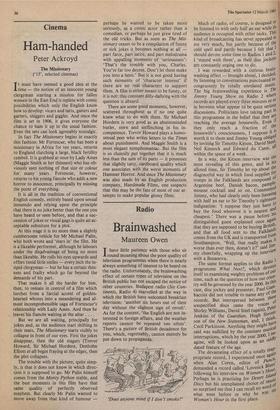Radio
Brainwashed
Maureen Owen
T have little patience with those who sit I round moaning about the poor quality of television programmes when there is nearly always something of interest to be heard on the radio. Unfortunately, the brainwashing effect of certain types of television on the British public has not escaped the notice of other countries. Budapest radio (Six Con- tinents, Radio 4) marvelled at the way in which the British have welcomed breakfast television: 'another six hours out of their day without the slightest sign of revolt'. As for the content, 'the English are not in- terested in foreign affairs, and the weather reports cannot be repeated too often'. There's a picture of British decadence for you, which, regrettably, cannot entirely be put down to propaganda.
`Does anyone mind if I don't smoke?' Much of radio, of course, is designed to
be listened to with only half an ear while its audience is occupied with other tasks. This kind of broadcasting has never appealed W me very much, but partly because of the cold spell and partly because I felt that I should devote some time to Radios 1 and 2, I 'stayed with them', as their disc jockeys are constantly urging one to do.
I was rewarded with a curious brain'
washing effect — brought about, I decided, by listening to conversations punctuated in- congruously by totally unrelated music. The big brainwashing experience is The Jimmy Young Show on Radio 2 where records are played every three minutes or so in between what appear to be quite serious discussions. Politicians love taking part in this programme in the belief that they are. reaching the average housewife. Even i' they only reach a fraction of the housewife's consciousness, I suppose it is worth it to them and Jimmy Young obliged by inviting Sir Timothy Kitson, David Steel; Neil Kinnock and Edward du Cann, ab within the space of a week.
In a way, the Kitson interview was the
most revealing of this genre, and in his alloted time, Sir Timothy let rip about the disgraceful way in which food supplies f°1-€ troops in the Falklands are composed 0' Argentine beef, Danish bacon, pamPle; mousse cocktail and so on. Commence
u
Jimmy, who had clearly only been listening with half an ear to Sir Timothy's righteous indignation: 'I suppose they just have te, buy the food wherever it is nearest and cheapest.' There was a pause before his distinguished guest explained once again that they are supposed to be buying British,' and that all food sent to the Falklands comes from the UK and is transported fil3r11. Southampton. 'Well, that really makes it worse than ever then, doesn't it?' said Jim- my cheerfully, wrapping up the interview
with a Bosanova. •1 The same format applies to the Radio
programme What Next?, which devotes, itself to examining weighty problems of our time, such as the question of how our coon' try will be governed by the year 2000. In this case, disc jockey and presenter, Paul Gal;;; baccini did not trouble to name any of t e records. But interspersed between thes, unspecified discs came the voices Shirley Williams, David Steel (again), Peter Jenkins of the Guardian, Hugh Steven: son of the New Statesman, and, I think' Cecil Parkinson. Anything they might have said was nullified by the constant musical interruptions, which by the year 2000, 1,,111`,, im- agine, will be looked upon as an 00'1 dated feature of the age. inaP The devastating effect of a totally
propriate record, I experienced oncpun in,
when Alan Coren, editor of ,, demanded a record called 'Lovesick Bhle' following his interview on Woman's HoUr. Perhaps he is practising for Desert Islatrc Discs but his unexplained choice of music of tls so surprised me that I can recall no word what went before or why he was 00 Woman's Hour in the first place.










































 Previous page
Previous page